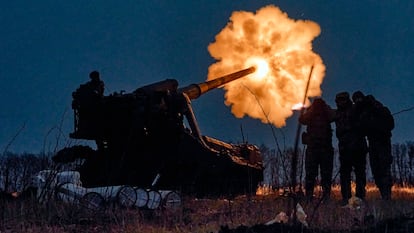Ukraine and Russia rule out Christmas ceasefire on the front lines
The Kremlin has flatly refused any discussion of a truce after Ukrainian President Volodymyr Zelenskiy called on Moscow to withdraw its troops at a G7 conference


What was until last year Kyiv’s Christmas golden mile today is a freezing remnant of that memory, as the possibility of a seasonal ceasefire between Russia and Ukraine seems ever-more distant. As snow blankets the city, there are no decorated trees, strings of fairy lights, or stalls catering to tourists. Passers-by focus on attempting not to slip on the ice covering the ground, barely noticing the square in front of Saint Sophia Cathedral that was once filled with Christmas spirit. The heart of Kyiv reflects the mourning that Ukrainians are in since the start of the war. Only a handful of stores and restaurants bear reminders that the year is drawing to a close. But there is another date that nobody will forget: February 24, the day that Moscow launched a full-scale military invasion of its neighboring country.
On the suggestion of the possibility of a ceasefire to coincide with the holiday season, a senior army commander made it clear that the fighting will continue until the last pair of Russian boots has withdrawn from Ukrainian soil. “I think that, from our side, there will be a complete ceasefire only when there are no invaders left on our territory,” Brigadier General Oleksii Gromov said Thursday during a meeting with journalists, as reported by Reuters and Ukrainska Pravda. Gromov’s response came to a question asking if a temporary laying down of arms could be observed to mark the festive period, an idea already rejected by the Kremlin.
“Very soon we’ll have holidays celebrated by billions of people,” Ukrainian President Volodymyr Zelenskiy said during a virtual conference with the G7 on Monday. “This is the time for normal people to think about peace, not aggression. I suggest to Russia to at least try to prove that it is capable of abandoning the aggression. It would be right to start the withdrawal of Russian troops from the internationally recognized territory of Ukraine this Christmas. If Russia withdraws its troops from Ukraine, it will ensure a lasting cessation of hostilities.”
Moscow was quick to respond to Zelenskiy’s call for peace: “No proposals have been received from anyone and no topic of this kind is on the agenda,” said Kremlin spokesman Dmitry Peskov.
Meanwhile, on the front lines, Ukrainian and Russian forces continue to try and force an advantage. On Thursday, Russian artillery bombarded the liberated city of Kherson in southern Ukraine, where two people were killed, and Kharkiv, in the northeast. Pro-Kremlin authorities in the occupied city of Donetsk denounced what they described as the largest attack in the area since the Donbas conflict erupted in 2014 and attributed it to Ukrainian troops, although no casualties were reported. The city of Bakhmut in the Donetsk region, which is almost entirely in Ukrainian hands, has witnessed the most intensive fighting between the two armies.
Oleksii, a 20-year-old in a discreetly decorated restaurant in downtown Kiyv, explains that Ukrainians are in a dilemma. On the one hand, this time of year leads to the desire to celebrate and put up Christmas decorations. On the other, the climate of war and the need to save money means people are keeping a low profile.
In front of Santa Sophia Cathedral, two men dressed up as bears are on the hunt for a souvenir photo in exchange for some money. Both are named Sergey. There are hardly any tourists and Ukrainians barely give them a glance in the middle of a war. A Nepalese Red Cross employee falls into their clutches. “There’s no snow in Nepal, is there?” says one of the Sergeys, with more salesmanship than geographic knowledge. His response is the smile of someone who arrived in Ukraine just a week ago from the country that is home to the Everest, the roof of the world.
Sign up for our weekly newsletter to get more English-language news coverage from EL PAÍS USA Edition
Tu suscripción se está usando en otro dispositivo
¿Quieres añadir otro usuario a tu suscripción?
Si continúas leyendo en este dispositivo, no se podrá leer en el otro.
FlechaTu suscripción se está usando en otro dispositivo y solo puedes acceder a EL PAÍS desde un dispositivo a la vez.
Si quieres compartir tu cuenta, cambia tu suscripción a la modalidad Premium, así podrás añadir otro usuario. Cada uno accederá con su propia cuenta de email, lo que os permitirá personalizar vuestra experiencia en EL PAÍS.
¿Tienes una suscripción de empresa? Accede aquí para contratar más cuentas.
En el caso de no saber quién está usando tu cuenta, te recomendamos cambiar tu contraseña aquí.
Si decides continuar compartiendo tu cuenta, este mensaje se mostrará en tu dispositivo y en el de la otra persona que está usando tu cuenta de forma indefinida, afectando a tu experiencia de lectura. Puedes consultar aquí los términos y condiciones de la suscripción digital.








































